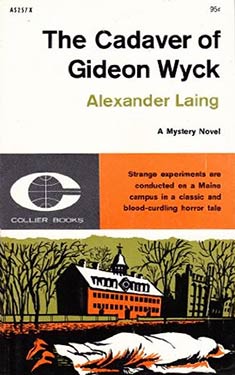
Added By: gallyangel
Last Updated: gallyangel
The Cadaver of Gideon Wyck
| Author: | Alexander Laing |
| Publisher: |
Valancourt Books, 2016 Centipede Press, 2012 Grosset & Dunlap, 1935 Farrar & Rinehart, 1934 |
| Series: | |
|
This book does not appear to be part of a series. If this is incorrect, and you know the name of the series to which it belongs, please let us know. |
|
| Book Type: | Novel |
| Genre: | Horror |
| Sub-Genre Tags: | |
| Awards: | |
| Lists: | |
| Links: |
|
| Avg Member Rating: |
|
|
|
|
Synopsis
The novel involves the disappearance and murder of one of the professors of "The Maine State College of Surgery". The book is narrated from the point of view of a senior medical student who is keeping a diary about the strange goings-on leading up to the death of Wyck. The narrator is also secretary to one of the other professors at the college and is privy to a lot of faculty gossip. There's also plenty of small town Peyton Place politics. And, of course, the book takes place right in the heart of Steven King country.
In some ways, Dr. Gideon Wyck is similar to Dr. House: cold, aristocratic, and demanding. One of the founding instructors at the college, he generally gets what he wants.
The actual murder of Wyck isn't discovered until half-way through the book. By this time, we've been shown countless people who would want Gideon Wyck dead. So who is the killer? Is it Wyck's daughter Marjorie? Could it be Pendergast, the medical student whom Wyck expelled for cheating on an exam? Is it the nurse Muriel, who might have had a thing going on with the old rascal? And what about Mike Connell, whose arm was amputated by Wyck? The list is extensive.
Furthermore, we learn about Wyck's secret laboratory where he was conducting experiments on poor pregnant women. Experiments which soon bear evil fruit in the still births of deformed infants. The book never delves too deeply into this area, but it is a chilling reminder (to us) or prophery (at the time) of the Nazi experimenting on their concentration camp inmates.
The novel is also a mirror of its time. There is an entire chapter devoted to an autopsy of an tuberculosis victim. The significance of this chapter strikes home as one of the students taking part in the examination is himself suffering from an advanced stage of the same disease. It's a good thing to remember how TB was once a death sentence for many people until the discovery of antibiotics.
I've often wondered why Karl Edward Wagner chose certain books for his list. My guess for Cadaver would be that it reflected his own experiences at medical school. The novel is filled with detailed information about the daily life of medical students. I doubt if much has changed since the time it was written.
--- reflections on the novel from a blog
Excerpt
No excerpt currently exists for this novel.
Reviews
There are currently no reviews for this novel. Be the first to submit one! You must be logged in to submit a review in the BookTrackr section above.
Images
No alternate cover images currently exist for this novel.



















 Full Details
Full Details






